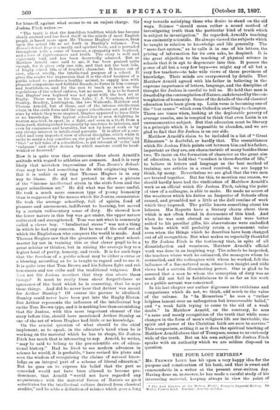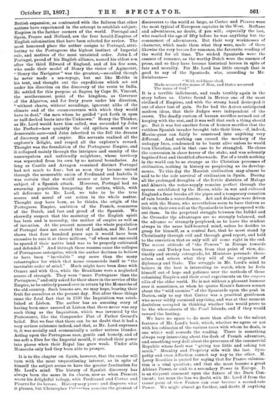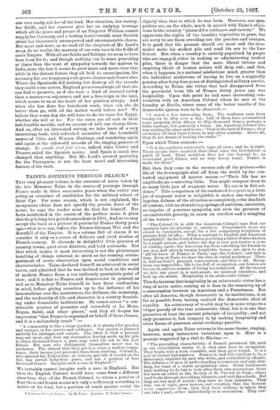THE FOUR LOST EMPIRES.*
Mn. FREWEN LORD has hit upon a very happy idea for the purpose and construction of his book, and that is sweet and commendable in a writer at the present over-written day. Having done so, moreover, he has made a careful study of his interesting material, keeping always in view the point of • The Lost Empires of the Modern World : Essays in Imperial History. By Walter Frewen Lord. London ; Bewley ani Sun.
British expansion, as contrasted with the failures that other nations have experienced in the attempt to establish subject- Empires in the farther corners of the world. Portugal and Spain, France and Holland, are the four herald-Empires of English colonisation that have been selected for review. The most honoured place the author assigns to Portugal, attri- buting to the Portuguese the highest instinct of Imperial rule, and motives of the most untainted order. John L of Portugal, proud of his English alliance, named his eldest son after the third Edward of England, and of his five sons, who made their model of Henry the victor of Agincourt, "Henry the Navigator" was the greatest,—so-called though he never made a sea-voyage, but sat like Moltke in his tent, and thought out the expeditions which set out under his direction on the discovery of the route to India. He settled for this purpose at Sagres by Cape St. Vincent, the southernmost point of the kingdom, as Governor of the Algarves, and for forty years under his direction, "without charts, without soundings, ignorant alike of the climate and of the ocean-currents with which they would have to deal," the men whom he guided "put forth in open or half-decked boats into the Unknown." Henry the Thinker, as Mr. Lord would have him called, was succeeded by John the Perfect—how quaintly the old epithets sound in our democratic ears—and John inherited to the full the dreams of discovery and of empire. His servants realised all the explorer's delight, and reaped all the explorer's reward. Thought was the foundation of the Portuguese Empire, and it collapsed mainly through the intrigues and enmity of the unscrupulous and unfriendly neighbour, whose territory was separated from its own by no natural boundaries. As long as Castile and Arragon remained distinct Portugal had not much to fear ; but as soon they became united through the memorable union of Ferdinand and Isabella it was certain that she would sooner or later become the subject of a Spanish attack. Moreover, Portugal had no swarming population hungering for outlets, which, with all deference to Mr. Lord, we take to be the true source and moral of our action in the whole matter.
Thought may have been, as he thinks, the origin of the Portuguese Empire, ambition of the French, commerce of the Dutch, and lust and greed of the Spanish. We shrewdly suspect that the mainstay of the English spirit has been and is necessity, the mother of empire as well as of invention. At the present moment the whole population of Portugal does not exceed that of London, and Mr. Lord shows that four hundred years ago it would have been excessive to rate it at three millions, "of whom not one could be spared if their native land was to be properly cultivated and defended." And through these reasons came the collapse of Portuguese enterprise, which the author declines to believe to have been " inevitable " any more than the many catastrophes for which that name commends itself to "the inevitable order of mind." Mach might have been done with Ormuz and with Goa, while the Brazilians were a neglected source of strength. They were "more Portuguese than the Portuguese," and only asked for their share in the service of the Empire, to be entirely passed over in return by the Monarchs of the old country. Such lessons are, we may hope, bearing their fruit for ourselves at the present day. Bat after these things came the fatal fact that in 1536 the Inquisition was estab- lished at Lisbon. The author has an amusing story of having been once assured at Lisbon that there never was any such thing as the Inquisition, which was invented by the
Protestants, like the Gunpowder Plot of Father Gerard's belief. But we fear that there can be no doubt that it had a very serious existence indeed, and that, as Mr. Lord expresses
it, it was socially and economically a rather serious blunder. Acting upon the Portuguese race, gentle and homely, and of too soft a fibre for the Imperial mould, it crushed their power into pieces when their Royal line grew weak. Under able Monarchs only had they been able to prosper.
It is to the chapter on Spain, however, that the reader will turn with the most unquestioning interest, as in spite of himself the subject seems to have the greater fascination for Mr. Lord's mind. The history of Spanish discovery has always been the same in its charm, now as when Prescott wrote his delightful trilogy, with Ferdinand and Cortez and Pizarro for its heroes. History may prove and disprove what it pleases, but Christopher Coln m bus remains the greatest of discoverers to the world at large, as Cortez and Pizarro were the most typical of European captains in the West. Ruffians and adventurers, no doubt, if you will; especially the last, who reached the age of fifty before he was anything but the commonest of adventurers. But their very weaknesses of character, which made them what they were, made of them likewise the very heroes for romance, the favourite reading of the world for all time. The wicked Spaniards were the essence of romance, as the worthy Dutch were the essence of prose, and so they have become historical heroes in spite ot fate and morality. For Mr. Lord has little enough that is good to say of the Spaniards, who, according to Mr.
Swinburne-
" With red flame shod, Made accursed the name of Man, and thrice accursed The name of God."
It is a terrible indictment, and reads terribly again in the story before us. Cortez found in Mexico one of the most civilised of Empires, and with the strong hand destroyed it out of sheer lust of gain. So far had the Aztecs anticipated modern ideas, that their Judges were independent of the crown. The deadly custom of human sacrifice seemed out of keeping with the rest, and it was well that such a thing should go. But it was but another form of human sacrifice that the ruthless Spanish invader brought into their lives,—if, indeed, Maxim-guns can fairly be construed into anything very different. And nothing can exceed the mockery of the
unhappy Inca, condemned to be burnt alive unless he would turn Christian, and in that case to be strangled. He chose the conversion in sheer terror of the stake, and was solemnly baptised first and throttled afterwards. For of a truth nothing in the world can be so strange as the Christian processes of civilisation, nothing in history so perplexing as its develop- ments. To this day the Moorish civilisation may almost be said to be the sole survival of civilisation in Spain. During all the prolonged droughts of the fertile districts of Malaga and Almeria the water-supply remains perfect through the system established by the Moors, while in wet and cultured England a frost breaks all the pipes and a temporary cessation of rain breeds a water-famine. Art and drainage were driven out with the Moors, who nevertheless seem to have thriven as little on their own soil as the Spaniards to have prospered with- out them. In the perpetual struggle between the Infidel and he Crusader the advantages are so strongly balanced, and the advance so strangely perplexed, as to leave the student always in the same half-hearted mind, unless he decides to grasp for himself, as a central fact, that he must stand by Christianity through evil and through good report, and hold to the conviction that so only will all come right in the end. The recent attitude of "the Powers" in Europe towards Greece and Turkey has been, from that point of view, dis- tinctly and sternly retrograde, let Ministers persuade them- selves and others what they will of the exigencies of diplomacy and State. The struggle in Mr. Lord's mind to believe in the best is interesting to watch, when he feels himself out of hope and patience over the methods of these colonising Empires and their cruel experiments on the corpora cilia of the older world. He is not without a pleasant humour over it sometimes, as when he quotes Keats's famous sonnet about the "wild surmise" of the Spaniards upon the peak in Darien, only to say that Cortez was a practical gentleman who never wildly surmised anything, and was at that moment doubtless occupied in thinking whether this would prove to be the whereabouts of the Pearl Islands, and if they would reward the looting.
We have no space to do more than allude to the salient features of Mr. Lord's book, which, whether we agree or not with his estimates of the various races with whom he deals, is one whiclt well rewards the reading. There is something always very interesting about the dash of French adventure, and something very dull about the processes of the commercial Republic. whose fault was "giving too little and asking too much." Morality and Propriety side with the last. Sym- pathy and even Affection cannot say nay to the other. M. Leroy Beaulieu is quoted for saying that for France colonisa- tion is a vital question ; and that she must become a great African Power, or sink to a secondary Power in Europe. It is an eloquent comment upon the future of the Dark Con- tinent; but none the leas we doubt with Mr. Lord if from the truest point of view France can ever become a second-rate Power. We might almost go farther, and doubt if anything can ever really rob her of the lead. Her situation, her variety, her thrift, and her resource give her an undying leverage which all the poses and weans of an Emperor William cannot supply for Germany, and a lasting laurel-wreath must flourish about her literature's unconquered and unconquerable charm. But more and more, as we read all the chapters of Mr. Lord's story, do we realise the mastery of our own race in the fields of outer Empire. With all our faults and failings, we seem to have been born for it; and though nothing can be more provoking at times than the want of sympathy towards the natives in India, none the less it seems to grow more and more clear that while in the distant future they all look to emancipation, the necessity for our temporary rule grows clearer and clearer also. Where the Spaniards did nothing but destroy all the records they could come across, England preserves always all that she can find to preserve, as if she were a kind of steward retin*. than a master,—a sojourner, and not a Sovereign in the land, which seems to us at the heart of her position always. And when she has done her beneficent work, what can she do better than go, with all the darker world before her ? We believe that some day she will have to do the same for Egypt, whether she will or no. For the races are all cast in their indefeasible moulds, and no amount of talk can change them. And so, after an interested survey, we take leave of a very interesting book, with refreshed memories of the household names of Clive and Warren Hastings, and wondering again and again at the old-world records of the ringing grooves of change. Le mond,e s'est fait vieux, indeed, since Cortez and Pizarro sailed the Spanish mains. And Spain is much less changed than anything. But Mr. Lord's avowed partiality for the Portuguese is not the least novel and interesting feature of his work.












































 Previous page
Previous page